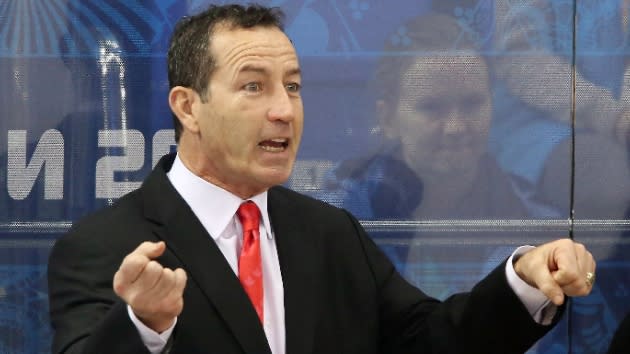Kevin Dineen is ready to build off his Olympic success with the Canadian men’s U-18 team
In the latter stages of his NHL career, Kevin Dineen always kept a notebook by his side.
The forward, who played 18 seasons with five different pro teams from 1984-2003, knew he wanted to stay involved in the game post-retirement and the notebook – where he’d jot down drills, faceoff plays and various strategies – perhaps best represented the coaching career he seemed destined for and would eventually gravitate toward.
It’s no surprise considering his father’s history behind the bench. Bill Dineen coached for 15 years in the WHA, AHL and NHL and when Kevin and his four brothers were growing up they’d often go down to the rink and watch their dad run through practices with the Houston Aeros.
“Those were pretty formative years for me,” Dineen recalled in a recent phone interview from Toronto.
Decades later the 50-year-old and second youngest of the five boys has a lengthy coaching resume he can point to and just last week he was named the head coach of Canada’s men’s under-18 team.
Working with a group of young players presents it’s share of challenges – Dineen pointed to the fact that many of them will be coming off disappointing finishes to their seasons – yet he’s excited about the opportunity it gives him to grow as a coach.
“We’re going to bring this group in really quick and try and get them functioning as a unit so there’s some real challenges on that front more so than on the strategic side,” he said. “It’s just turning a group of players into a team in a really short time span.”
It was only five months ago that the Florida Panthers fired Dineen after parts of three seasons as the team’s head coach. But rather than dwelling on what he could have done to maintain a job in the NHL, the 50-year-old Quebec City native decided to give Bob Nicholson, the president of Hockey Canada, a call to inquire about the possibility of getting involved with the world championship team that the country will send to Belarus in May.
“You take a little bit of [a] shot earlier in the year when you’re fired and there’s a whole range of emotions you go through,” he said. “You just put your body of work out and hopefully good things follow.”
And they did. Nicholson called Dineen back three days later, but it wasn’t to discuss the world championship team.
“Bob called me and asked if I’d be interested in the [head coaching] position with the women’s Olympic team,” Dineen said.
It was less than two months before the Opening Ceremony in Sochi and Dan Church had abruptly resigned.
Dineen immediately accepted the position and it’s a decision that not only got his foot back in the door of coaching, but also led to the most memorable experience of his career to date – a gold medal.
He recalls the feeling of both excitement and relief that went through him almost simultaneously when Marie-Philip Poulin scored in overtime to cap an unforgettable comeback against the United States in the gold-medal game.
“I think during the game you’re so incredibly focused on the moment, meaning who I have on the ice and how much time is left in the 4-on-3 we had, who the next player going on the ice was going to be,” he said. “When I saw [Laura Fortino] faked that slapshot and put it over to Poulin, we had the perfect angle from the bench and I think everyone of us on the bench could see there was a lot of net available and the puck was certainly on the right player’s stick . . . I’d be fibbing a little if I didn’t say there was a sense of relief when the puck went in.
“Lets not forget we were three minutes away from having a major disappointment in Sochi, how quickly that turns the other way and how dramatic that was I find it just inspirational. I think those players made me better at what I do.”
Dineen isn’t sure or concerned with whether his success in Sochi played a kind of factor when Hockey Canada was putting together its list of coaching candidates for the U18 team, he’s just excited to have been chosen and given the opportunity to work with a different group of players.
“We set the bar pretty high for Canadian hockey. How that reflects on me individually, I can’t concern myself with that. I can’t really say if I have success here it’s going to lead to something else. I don’t think that’s the way I function. I look at it as a real short term window to again get better as a coach and hopefully in a real short time span help these kids become better players and represent Canada in the way we expect them to.”
While his ultimate goal is to get back behind the bench in the NHL, he’s a realist and understands it could be years before someone offers him a second chance.
“There’s only 30 jobs out there and there’s a lot of really good coaches not only in the NHL, but there’s a lot in the American League, there’s a lot in the Canadian junior leagues and there’s a lot of guys on the sidelines.
“You look at a guy like Ken Hitchcock, he waited a couple years before the opportunity with St. Louis arrived. Paul Maurice had to take a bit of a breather before his opportunity arose in Winnipeg. Darryl Sutter in L.A. had taken a little bit of a different career path before winning the Stanley Cup with the Kings. So you go out and you just put your body of work out there and you just see how things play out.”

 Yahoo Sports
Yahoo Sports 


